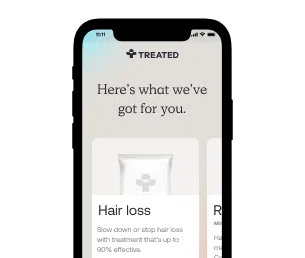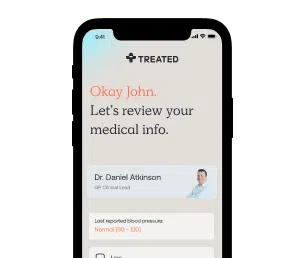Herpes
Highly effective, short-course tablet treatments for herpes.
Secure delivery
UK clinicians
Herpes is one of the most common STIs in the world and can be contracted by people of all ages.
Answer a few questions about your health, and get tailored treatment recommendations from our experts. Order herpes treatment online and get it delivered from our pharmacy.
Herpes is a very common sexually transmitted infection that’s passed from one person to another through skin to skin contact and unprotected sex.
Herpes is caused by the simplex virus (HSV), of which there are two main versions: HSV-1 and HSV-2.
Both versions of the virus cause blisters and sores. When the blisters and sores occur around the mouth, the infection is referred to as oral herpes. But when they occur around the vagina, anus and penis, it’s referred to as genital herpes.
HSV-1 is usually associated with oral herpes, and HSV-2 is usually associated with genital herpes, but both versions of the virus can occur in both places. For example, you can get HSV-1 on your genitals if someone with a cold sore gives you oral sex, and you can get HSV-2 on your mouth if you give oral sex to someone with HSV-2 on their genitals.
Herpes is spread by skin-to-skin contact, and the risk of getting it is increased by having unprotected sex.
Many people get genital herpes from having unprotected vaginal or anal sex with someone carrying the infection. Oral herpes is mostly spread by oral sex and kissing someone who’s infected.
People often get herpes from someone who doesn’t know that they’ve got it, because it doesn’t always cause symptoms. And once the herpes virus is in your system, it can’t be removed (don’t worry, the symptoms can be treated).
Despite what some people believe, you can’t get herpes from toilet seats, swimming pools or by hugging someone.
Women who get herpes when they’re pregnant are likely to give birth to a healthy baby. There’s a small risk that herpes during pregnancy can cause the baby to contract neonatal herpes. This can be serious, but there’s antiviral treatment that can be given to the baby to treat the infection.
A baby is less likely to contract herpes if its mother has had it before.
Genital herpes is most common in people between the ages of 15-30 due to an increase in sexual activity between these ages.
Herpes is extremely common across the world. 3.7 billion people under the age of 50 have the HSV-1 virus, and 491 million people aged 15-49 have the HSV-2 virus.

How we source info.
When we present you with stats, data, opinion or a consensus, we’ll tell you where this came from. And we’ll only present data as clinically reliable if it’s come from a reputable source, such as a state or government-funded health body, a peer-reviewed medical journal, or a recognised analytics or data body. Read more in our editorial policy.
Herpes is caused by the herpes simplex virus (HSV). Once the virus is in your body it stays there indefinitely. It can stay dormant for long periods of time, but once it’s reactivated it can cause a breakout. People with the virus commonly experience up to six breakouts of it every year.
The HSV virus enters the body through the skin and travels to the nerves. It does not cause any damage to the nerves, and symptoms are seen on the skin in the form of blisters and sores.
Most people don’t know that they have herpes because it doesn’t always produce obvious symptoms. Analysis shows that 70% of infections occur from sexual contact with someone who doesn’t know they’ve got the virus.
Symptoms usually occur between two and 12 days after the virus has been contracted.
Symptoms of oral herpes (HSV-1) include:
Symptoms of genital herpes (HSV-2) include:
During a breakout, itching and burning are usually felt before blisters appear.
The symptoms are more severe the first time you get the virus and tend to be mild or absent during breakouts.
Women are more likely to contract the virus and are less likely to contract HSV-2 (genital herpes) if they already have HSV-1 (oral herpes).
Pregnant women can pass herpes to their baby and this causes neonatal herpes. This is a rare condition, but can be fatal. It’s treated with antiviral medication.
Having genital sores can also increase your chances of getting other STIs due to the open sores and blisters coming into contact with other infections.
In rare cases, blisters around the genital area can cause inflammation in the tubes that carry urine out of the body and this can cause urine to collect in the bladder. This will need to be taken out of the body through a drain (catheter).
In very rare cases the HSV infection can lead to meningitis as the infection can cause inflammation in the fluid around the brain and spine.

How we source info.
When we present you with stats, data, opinion or a consensus, we’ll tell you where this came from. And we’ll only present data as clinically reliable if it’s come from a reputable source, such as a state or government-funded health body, a peer-reviewed medical journal, or a recognised analytics or data body. Read more in our editorial policy.
Once you have herpes, it stays in your body forever because there aren’t any medicines that can destroy it. There are antiviral medicines that can treat the initial infection and soothe painful symptoms. There are also medicines that can help to treat symptoms of future breakouts, and some that can prevent the likelihood of breakouts.
Aciclovir, Famciclovir or Valaciclovir are antiviral medicines prescribed when you first contract herpes. It’s important to start treatment within five days of the symptoms appearing. The treatment is taken daily and can ease symptoms and even prevent an outbreak altogether. A course of treatment usually lasts between three to seven days.
There are creams and ointments available to help ease the painful symptoms of herpes. These soothe cold sores and blisters around the mouth.
There isn’t a ‘best’ treatment for herpes because the most suitable treatment for you will depend on your body and the type of infection you have.
The best thing to do is speak with a clinician who will be able to help you to develop a treatment plan that suits you.
Whilst there isn’t a cure for herpes, it’s possible to treat the symptoms effectively. It’s important to do this to reduce the risk of passing the infection to others. Analysis shows that 70% of infections occur from sexual contact with someone who doesn’t know they’ve got herpes.
The course of treatment for herpes is short and effective, making it something that can be overcome quickly and easily.

How we source info.
When we present you with stats, data, opinion or a consensus, we’ll tell you where this came from. And we’ll only present data as clinically reliable if it’s come from a reputable source, such as a state or government-funded health body, a peer-reviewed medical journal, or a recognised analytics or data body. Read more in our editorial policy.
Have something specific you want to know? Search our info below, or ask our experts a question if you can’t find what you’re looking for.
Herpes simplex virus. [online] Who.int.
Risk Factors for the Sexual Transmission of Genital Herpes. Annals of Internal Medicine, 116(3), p.197-202.
Risk Factors for the Sexual Transmission of Genital Herpes. Annals of Internal Medicine, 116(3), p.197-202.
A double-blind study of oral acyclovir for suppression of recurrences of genital herpes simplex virus infection. The New England Journal of Medicine, 310(24), pp.1551–1556. [Accessed 12 Oct. 2021].

Generic version of Valtrex. 5 day course of tablets that helps to clear symptoms.

Antiviral tablet that treats symptoms and delays recurrences. Generic (cheaper) version of Famvir.

Registered with GMC (No. 4624794)
Meet Daniel
Registered with GPhC (No. 2202465)
Meet Sanjeda
Registered with GPhC (No. 2070724)
Meet Craig
Always read the leaflet that comes with your medication and tell us about any side effects you get.
We know health, but you know you.
Our experts tell you what’s safe, but you decide what’s best.
Answer a few questions and tell us about yourself. Get tailored advice from our clinicians so you can choose better.

Choose your treatment and how often you have it delivered.

We know things change. It’s the nature of life. We’ll check in regularly to make sure your treatment is still right for you.
Pause. Change. Skip. Start again. Any time you like.
Here are some other things we can help with.
Choose from our range of tablets and solutions. Get ongoing care and support from our experts.
Stop smoking treatments that can help you kick the habit forever, and reduce your risk of disease.
Tablets or injections. Tailored weight loss treatments combined with ongoing support from our experts.
We're making healthcare more about you. Sign up to our newsletter for personalised health articles that make a difference.
Disclaimer: The information provided on this page is not a substitute for professional medical advice, diagnosis, or treatment. If you have any questions or concerns about your health, please talk to a doctor.
We couldn't find what you're looking for.
Here's everything we treat. Or, if you're looking for something we don't have yet, you can suggest something.
If there’s a particular treatment or condition you’re looking for, tell us and we’ll look into it for you.
Submit your question here, or tell us if you’ve found an issue on our site.
We’ll get back to you very soon. We aim to respond to all queries in one working day.
You’re signed up to our newsletter. Keep an eye on your inbox for our latest update.
By clicking 'Subscribe now' you're agreeing to our Privacy Policy.
We’ve sent you an email asking you to confirm your email address.